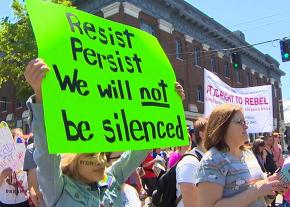Pride and justice stand together
reports from Seattle day of protests for LGBTQ pride and equality.
MORE THAN 2,000 people gathered in Seattle's Capitol Hill neighborhood on June 11 and marched to the city center in support of LGBTQ pride and equality.
The march was one of several across the U.S., including a gathering in Washington, D.C., that were aimed at being more political than the official LGBTQ pride marches later in June, which started as a commemoration of the Stonewall Rebellion, but have morphed into an apolitical event, sponsored in part by corporations.
Brooklyn activist David Bruinooge called for the day of protests on a Facebook page back in January, saying he was inspired by the Women's Marches on January 21. The vile homophobia of the Trump administration continued to drive interest in the demonstrations around the country.
Transgender pride was a strong theme throughout the day in Seattle. Speakers also expressed solidarity with other groups under attack in the age of Trump. One speaker introduced herself as a "radical, proud, out lesbian and Muslim" to loud cheers from the crowd.

Speakers urged people not to give their signatures to put Initiative 1552 on the ballot. If passed, the referendum which would enforce a law like the notorious one in North Carolina that forces people to use bathrooms of their birth gender, rather than the gender they identify with. Activists circulated through the crowd with " decline to sign" petitions.
One extremely popular act was a beautiful rendition of John Lennon's utopian socialist anthem "Imagine."
The radical political message of solidarity was mixed with calls for support of gay businesses. One of the sponsors was the Greater Seattle Business Association, which also sponsors the official Pride event at the end of the month. Politicians in support of LGBTQ rights were also featured from the speakers' platform.
Meanwhile, sections of the march broke out in chants defending immigrants, Muslims, the African Americans and other oppressed groups. One of the most popular was "When queer rights are under attack, what do we do? Stand up, fight back!"


